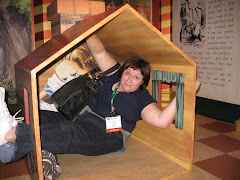Admittedly, he was wearing a tee shirt that was deemed offensive. (Whether it was or not is not the point.) But, he did as others have done, turned it inside out and went about his visit. I was not present on this trip, and of course my own biases are coloring my opinion. It is possible that to one set of eyes, it was entirely justified. But, from most reports, the majority of what was happening was commentary on the exhibits. Mocking, yes. Loud, by some reports. But no one was swearing, no one was threatening, no one was defacing anything. The major issue seems to be the real or perceived discomfort that other visitors experienced.
So the question becomes - is mocking the content of an exhibit enough to get you kicked out? And how much does the context of the exhibit play into that? Is a museum that is afraid of ridicule and criticism doing any good? Is it ok to reprimand or expell one visitor for the comfort of another?
Situation 1: At a modern art exhibition, a PhD student is intently studying visitor reaction to an installation. His attention wavers when a family comes in and loudly begins mocking the work - "My 4 year old could do this," "This isnt art," and so on. The student tells the security guard that the family is ruining his visit.
Situation 2: A curator is about to give a docent tour of a natural history hall. After gathering a crowd, she notices a large group on their own tour, complete with leader. The other group is using the dinosaur display to discuss ways to teach creationism. The curator is afraid that this group will counter her information and upset her group.
Situation 3: A school group is visiting the the Holocaust Memorial. Another group there at the same time is discussing the exhibits and making comments that deny the holocaust and seem anti-Semetic. The group is not overly loud and is not being aggressive, but the children in the school group are trying to listen in. The teacher is very worried that some children might be swayed by their rhetoric. She informs a guard.
So, what do you do? Each situation is different, and context does matter. Is it different for a private institution vs. a pubilc one? Where do we draw the line between allowing discourse and censoring speech? Is free speech a right in a museum?
Me? I get it. The Creation Museum is much like the group in Situation 3. The families involved were worried that their children would overhear the rhetoric and suddenly become "eeeevil atheists" (muauhahahahah). I understand. It makes me sad, but I understand. I hope that other museums see this incident and take heed. A truly educational organization allows for discourse and disagreement. It embraces multiple viewpoints and helps people winnow out their own truth. It does not proselytize and it does not censor. Yes, even if a Holocaust denier is giving a tour of the Holocaust Memorial - a good educator uses that as an opportunity to teach.
The sad thing is, AIG could have used this moment for good, but instead, they showed that they really are preaching to the choir, and they have no need for any of the rest of us.
